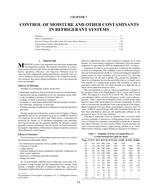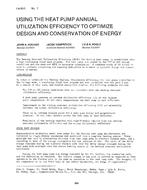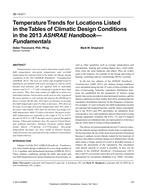From early on in the design process, it has been the owner’s aim to obtain Platinum LEED® rating for the new California Academy of Sciences building in San Francisco, designed by Renzo Piano. In order to obtain the LEED points which derive from Credit EQ-2, one of two methods, or “compliance pathsâ€Â, may be used; either measurement of air flows in the field in the completed building or computer modeling to simulate the ventilation effectiveness. In our experience the latter is more cost effective than in-situ testing for this particular building given its shape and ventilation strategy. Moreover, the numerical analysis provides the opportunity for fine tuning of the building during design if necessary to ensure the LEED credit is obtained. A Computational Fluid Dynamics (CFD) analysis of the exhibit hall was carried out to provide a means of calculating the Mean Age of Air and the Air Change Effectiveness at all points inside the modeled zone, as per described in ASHRAE Standard 62-2001. No-wind conditions represent the worst case scenario when ventilation relies principally on buoyancy and/or stack effect.
This paper will outline the steps of the study, from building the CFD model, running the model for winter and summer conditions, performing the virtual “tracer gas decay†experiment as described in ASHRAE Standard 129-1997, and presenting the results in terms of Ventilation Effectiveness. While CFD is now a commonly used tool in building engineering, and in particular for natural ventilation design (see Lavedrine et al, Zhang et al, Haghighat et al, and Gulick), the author is not aware of any other published work where CFD has been used to calculate Ventilation Effectiveness by following ASHRAE Standard 129-1997.
The results of the numerical analyses show that the ventilation effectiveness of the Exhibit Hall exceeds the LEED criteria, and additionally provides a means to prove a performance-based code compliance for the space. The new California Academy of Sciences is due to open in 2008.
IAQ 2007 Conference held in Baltimore, Maryland, October 14-17, 2007
Units: I-P
Citation: IAQ Conference: IAQ 2007: Healthy and Sustainable Buildings
Product Details
- Published:
- 2008
- Number of Pages:
- 7
- File Size:
- 1 file , 550 KB
- Product Code(s):
- D-IAQ2007-34


